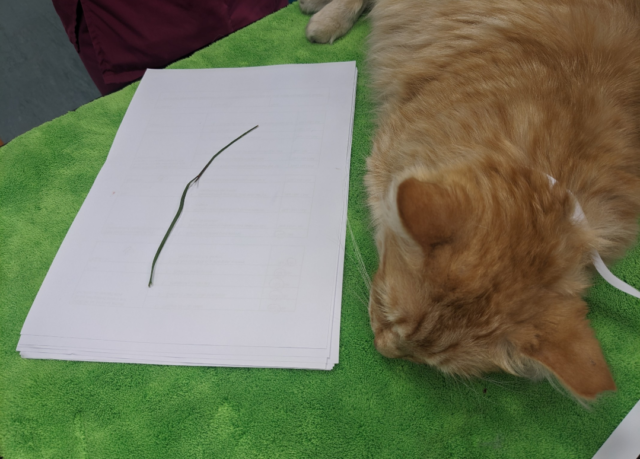A cat from Nottingham, who transformed his owner’s life after she was diagnosed with cancer, has been saved by vet charity PDSA who removed a 10cm blade of grass from his nose.
Ginge, (6), was taken to Nottingham PDSA Pet Hospital after his owner Laura Mellors, (52), said he was struggling to breathe and sneezing blood.
“It was very scary,” she explained. “Ginge was having sneezing fits and coughing, and then all of a sudden he started bringing up blood. I didn’t know what to do.”
Laura, who was eligible for the charity’s services after having to give up work when she was diagnosed with cancer a few years ago, took him to her local PDSA Pet Hospital straightaway.
“PDSA were amazing,” she added. “The team sedated Ginge and pulled out a huge 10cm blade of grass, I couldn’t believe it.
“You couldn’t see anything stuck in his nose or in his mouth so it must have been pretty far back. After the vets got it out Ginge was back to his normal self almost instantly. I can’t thank them enough!”
Laura was diagnosed with breast cancer at the start of the pandemic and had to give up her job in Tesco. Because of her Employment and Support Allowance (ESA), it meant she was eligible for the charity’s veterinary services.
“From my diagnosis, to the pandemic and now the cost-of-living crisis, it’s been a hard few years and I’m so thankful to PDSA for being there for Ginge and for me,” she shared.
Laura lives in Bestwood with her partner Sam, (62). She said Ginge is a big part of the family after ‘choosing her’ when he appeared in her garden as a stray cat.
“Ginge came into our lives around the same time I was diagnosed with cancer,” she explained.
“I feel like he chose us to be honest. He was a stray cat who used to come and sit in our garden. One day he came in through the back door, and then he never left. We tried to see if he was owned by anyone – we asked our neighbours, and took him to be scanned for a microchip but nothing came of it.
“We wouldn’t be without him for the world though – he’s an amazing cat! He’s slow and chilled out, he plods around the garden and sits in the sun.
“He’s always eating bits of grass and even though I tell him to stop, I didn’t think it would cause much harm. But I’ll definitely be a lot more mindful of this from now on.”
PDSA Vet Catherine Burke explained that this is common amongst cats and can be tricky to diagnose and treat.
“When a cat gets a blade of grass lodged in the back of their nose or throat, it can be very uncomfortable and irritating for them, and could cause an infection,” she explains.
“It can cause severe bouts of sneezing or coughing, and in some cases such as Ginge’s, the cat can start sneezing or coughing up blood which can be very distressing for both cat and owner.
“It can be really difficult to prevent this from happening, as cats will often wander where we can’t keep an eye on them. If your cat eats grass in your own garden, keep it cut short to reduce the risk of the longer grass blades getting stuck.
“Sneezing from time to time is nothing to worry about, but you should contact your vet if your cat can’t stop sneezing, sneezes blood or seems to be in pain.”
In times of hardship, pets like Ginge will still fall ill or become injured and need emergency care. PDSA is appealing for donations so that the charity can continue to support owners who have nowhere else to turn by providing life-saving care to vulnerable pets. To donate, visit pdsa.org.uk.




